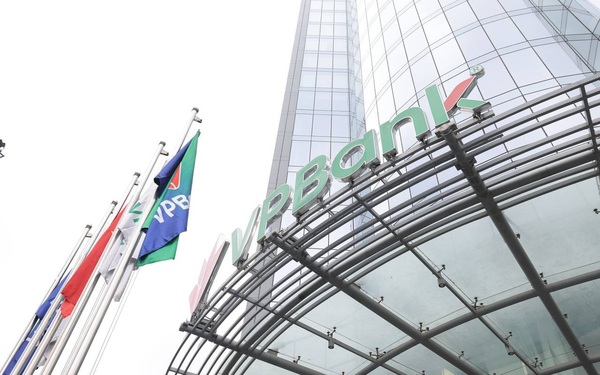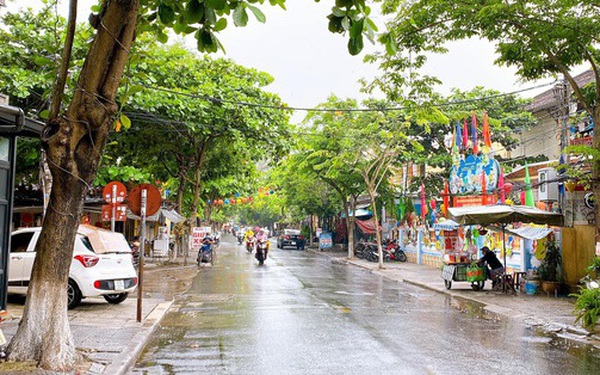Wave of protectionism exacerbates food crisis?
The trend of food protection is spreading around the world
The Russia-Ukraine conflict has squeezed global food supplies, pushing prices up at the fastest rate ever. In that context, a new risk is becoming more and more obvious, which is a wave of countries imposing measures to limit or ban food exports to ensure supply for the domestic market.
Follow BloombergAsia is emerging as the epicenter of this protectionist wave, as more and more countries impose export restrictions.
Malaysia has said it will suspend chicken exports from June 1, in the context of the country facing a domestic supply shortage and escalating prices.
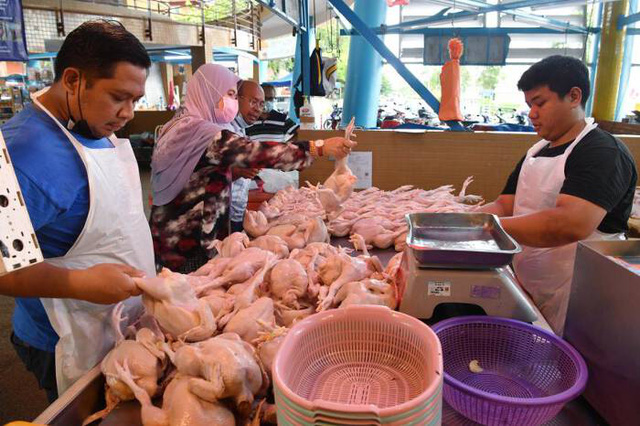
Malaysia temporarily stopped exporting chicken from June 1. (Illustration image – Photo: Bernama).
Before that, another Southeast Asian country, Indonesia, also had to suspend palm oil exports for the same reason.
India – Asia’s 3rd largest economy also recently issued a ban on wheat exports and restricted sugar exports on the grounds of ensuring stability in the domestic market.
Leaders of countries explain the issuance of export restriction orders
“I have decided to ban the export of cooking oil. I will closely monitor and evaluate the implementation of this policy to ensure that the domestic cooking oil supply remains abundant,” said Indonesian President Joko Widodo.
“We do not want the wheat trade to go out of control, which could lead to speculative hoarding that prevents wheat from being used for the right purpose of serving the food needs of countries. and vulnerable consumers,” said BVR Subrahmanyam, Deputy Minister of Commerce of India.
Follow BloombergCurrently, nearly 30 countries have imposed export restrictions since the conflict broke out in Ukraine and this trend is expected to increase in the near future, exacerbating the crisis. global food.
Food protection exacerbates global inflation
According to United Nations statistics, prices of many staples have become more expensive this year, for example milk prices increased 14%, palm oil prices increased 38%. Wheat futures prices have even increased by as much as 56%, while global stocks are forecast to be enough for only 10 weeks.
This price escalation is currently causing great difficulties for people and businesses in many countries.
According to experts, people in poor countries will be the most vulnerable to shortages and rising food prices. According to the World Food Program, famine is currently affecting 43 countries, affecting 325 million people.
“Put yourself in the shoes of people in low- or middle-income countries, where you’re going to have to spend at least 50 percent of your income on food. And then all of a sudden these commodities have skyrocketed in price. That’s the reality that is happening in many parts of the world,” said Arif Hussain, chief economist of the World Food Program.
Richer countries are no exception. In Britain, nearly 10 million people have had to cut food spending due to rising prices, while the French government is expected to issue preferential food vouchers to struggling households. In the US, anxiety is also growing as inflation is at a 40-year high.
“I don’t think prices have peaked and can still go higher. Things are very bad, but the worst is probably yet to come,” said Sarah Steckler, US consumer.
Businesses operating in the food and beverage business are also suffering heavy losses. From distribution companies to restaurants and eateries, all of them stood still before the impact of export restrictions.
“Right now we are trying to narrow the gap between supply and customer demand. Most are looking to buy more chickens to store and have enough stock to sell in the near future. They are feeling feeling worried,” said Mr. James Sim, development director of KEE SONG Food Group, Singapore.
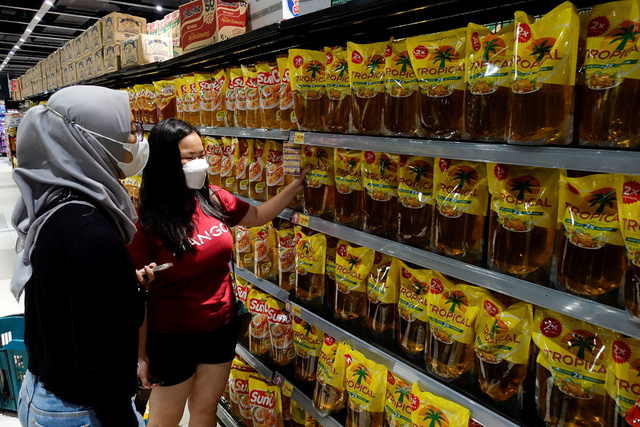
Indonesians buy cooking oil made from palm oil at a supermarket in Jakarta. (Photo: Reuters)
“I had to find a way to survive, but now the cost of labor and everything has increased. If the price of cooking oil goes up again, I have no choice but to raise the price,” said Kang Jung A, the owner of the house. goods in Korea, share.
With protectionism emerging at a time when the world food supply chain is facing many challenges, from climate change, the COVID-19 pandemic to conflict, analysts fear. , global inflationary pressure may increase even more in the coming time, becoming a difficult problem for central banks.
All countries confirmed that export restrictions are temporary and will soon be lifted as soon as supply in the domestic market returns to stability.
However, many argue that export restrictions cannot be considered as a sustainable solution in the context that the global economy is closely linked and dependent on each other and any disturbance, even if only At one link, there may also be risks for the whole system. This view has been reaffirmed by Kristalina Georgieva, Managing Director of the International Monetary Fund (IMF), in an interview on the sidelines of the World Economic Forum (WEF) in Davos, Switzerland this past week.
“There are two things that need to be done and done quickly. One is to prevent trade restrictive measures, when there are already 30 countries restricting the export of food items. This only makes the crisis worse. crisis gets worse. Second is to increase food production wherever possible. This can be done by providing financial support to farmers to produce more,” said Kristalina Georgieva, The Director General of the International Monetary Fund (IMF), commented.
Increasing food production anywhere may be an urgent requirement for all countries. However, in addition to financial support policies to encourage production, farmers also need to be assured that their products can be sold at a good price, not affected by restrictive measures. export processing.
Export restrictions make agricultural production difficult
The city of Khanna, Punjab is home to the largest grain market in India as well as in Asia. However, these days, farmers and traders here are facing a lot of difficulties with the consumption of goods, after the government ordered to suspend wheat exports.
“Here and many other places started to see the price drop. A few days ago the price of flour was Rs 2,350 per quintal, but today it has dropped to Rs 2,250,” said Raj Sood, a grain trader. India, said.
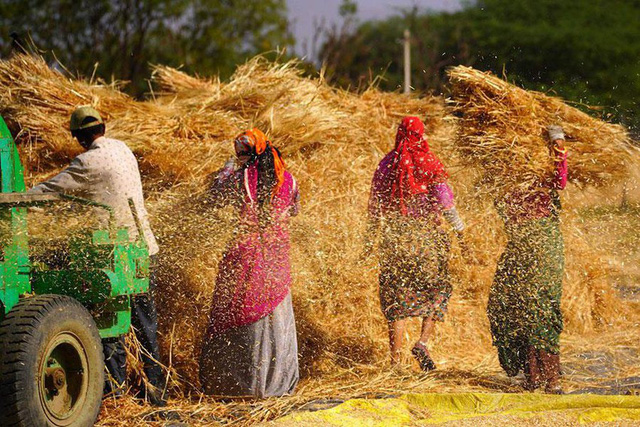
Farm workers harvest wheat in a village on the outskirts of Ajmer, Rajasthan state (India). (Photo: PTI)
Many farmers, who were already struggling when their output was affected by natural disasters this year, are now finding it harder to lose revenue from selling to exporters.
“We only got almost half of the output compared to the previous crop due to the unusual heat, and now we can’t even sell,” said Rajwant Singh, an Indian farmer.
According to experts, instead of banning exports, India can come up with other measures to stabilize domestic supply, such as subsidies to farmers to encourage them to increase the area under cultivation.
The risk of damage to domestic producers is also one of the reasons why Indonesia lifted the ban on palm oil exports after only 3 weeks. This is a necessary decision when the domestic cooking oil price has cooled somewhat and the demand for Indonesian palm oil from the international market is huge.
“The majority of our total production is for exports. If the ban lasts too long, everything will become chaotic, manufacturers will lose motivation to increase production,” said Mr. Sahat Sinaga, General Director of Indonesian Vegetable Oil Association, assessment.
As a key export item of the nation of ten thousand islands, palm oil contributes greatly to the country’s foreign currency earnings. Experts estimate that the damage to Indonesia could be up to 3 billion USD from the recent export ban.
According to the World Trade Organization (WTO), in the long term, increasing production and increasing trade is the key to responding to the current food crisis, not export restrictions. , because no country can tackle the challenges alone.
at Blogtuan.info – Source: cafebiz.vn – Read the original article here
